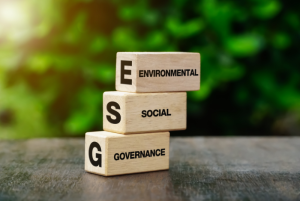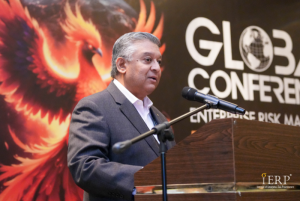@ the IERP® Global Conference, August 2023
Presentation Overview:
Max Lee, CEO of Pantas Software Sdn Bhd, delivered a focused discussion on the integration of technology with Environmental, Social, and Governance (ESG) strategies. He touched upon carbon accounting, its similarities to financial accounting, and the potential of technologies like AI, ML, IoT, and blockchain.
Carbon Accounting: Lee defined carbon accounting as measuring, managing, and disclosing a company’s greenhouse gas emissions using internationally recognized guidelines such as the Greenhouse Gas Protocol, SASB, GRI Standards, TCFD, and ISSB. He drew a parallel saying, “Just as financial accounting tracks cash inflows and outflows, carbon accounting tracks carbon emissions. Notably, most companies primarily deal with carbon outflows.”
Lee described how emissions data, multiplied by an emission factor, provides a company’s carbon footprint. He emphasized that the right software can streamline this process.
Scope Emissions:
Scope 1: Emissions from company-owned activities, e.g., premises (stationary combustion) and vehicles (mobile combustion).
Scope 2: Emissions from utilities like electricity and heating purchased by the company.
Scope 3: Encompasses the entire value chain/supplier chain emissions. It includes eight upstream and seven downstream categories. It’s significant to note that almost 80% of a company’s total emissions are within Scope 3.
Highlighting the intricacy of Scope 3 reporting, Lee mentioned that technologies like AI and blockchain (for traceability) are crucial. With the European Council’s Carbon Border Adjustment Mechanism (CBAM), companies exporting to the EU will soon face a Carbon Border Tax. The reporting will start in October 2023 and CBAM tax will be imposed in January 2026. CBAM will first target products from 5 sectors: cement, iron and steel, aluminium, fertilisers, and electricity.
Global Regulatory Landscape:
Regulatory bodies, like Bank Negara Malaysia, are producing guidelines such as the TCFD Application Guide. ISSB standards under IFRS which will be adopted globally starting in January 2023 will focus on Scope 3 details, emphasizing that companies everywhere will eventually need to align with a framework. Lee cautioned, “Merely being a supplier to a firm that sells to European clients brings you under Scope 3 regulations.”
Pantas’ Solution:
To address these challenges, Pantas has developed a carbon management software solution focusing on supply chain emissions (Scope 3). Companies failing to comply risk losing European clients and multinational corporations. Pantas has partnered with Bank Negara Malaysia to launch the Greening Value Chain Program (GVC) to facilitate sustainable transitions for Malaysian suppliers, especially SMEs. This program provides capacity building, technical advisories, carbon accounting software, and sustainable financing.
Pantas CTO, Eong Tat Ooi, introduced the firm’s AI/ML software, which reduces the challenges of carbon accounting by minimizing human errors and streamlining the process. “After gathering your consumption data, finding the correct emission factors are essential,” Eong emphasized. The software simplifies the entire carbon accounting process by integrating machine learning predictions to find the emission factors and improving the data quality through anomaly detection with unprecedented insights by generating responses to queries in natural language.
In Conclusion:
The GVC Program, described by Eong as a custom solution for managing supply chain emissions, can cater to regulatory requirements and offer customised, AI-driven solutions, allowing companies to produce timely and accurate reports. He summarized, “Technology, when tailored to a company’s needs, can drastically simplify and improve carbon accounting processes.”


























